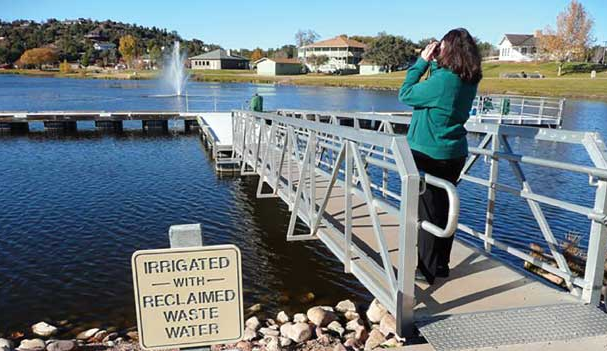It’s almost impossible to imagine life without running water, as long as it’s clean. But there are millions of people in the world who don’t have access to clean drinking water. They spend their days collecting dirty water in buckets. Our goal should be to help make recycling and reducing waste easier and more efficient. When we put the whole picture together, recycling is the right thing to do. Water reclamation is the treatment or processing of wastewater to make it reusable with definable treatment reliability and meeting appropriate water quality criteria or we can say water reuse is the use of treated wastewater (or reclaimed water) for a beneficial purpose.
Water reclamation and reuse are often discussed to reduce and replace the consumption of limited clean water in aquaculture as well as industrial sectors. Recycled water can be applied for diverse perspectives to share the burden of freshwater sources. Water recycling is a critical element for managing our water resources. Through water conservation and water recycling, we can meet environmental needs and still have sustainable development and a viable economy.
Recycled water can satisfy most water demands, as long as it is adequately treated to ensure water quality is appropriate for use. In many areas of the world, the entire potential of using reclaimed water is not yet explored. Moreover, different national and international bodies defined different guidelines for reclaimed water specific to the particular use. In cities, municipal wastewater is typically cleaned through a series of mechanical, biological and chemical processes to ensure it is safe and sanitary prior to being released to a natural body of water.
Wastewater treatment systems, initially designed to preserve human and environmental health, have advanced to a level where this wastewater can be reclaimed and safely used for other purposes. Reclaimed water, also known as recycled water, or repurified water, can be used for a variety of beneficial purposes, such as landscape irrigation, industrial processes, toilet flushing or drinking which is a solution for the future to combat water scarcity. It can be used for a variety of applications including watering green spaces and golf courses, crop irrigation, fire-fighting and street-cleaning, or it can be used to recharge aquifers. The water and nutrients that can be recovered from the wastewater are simply too valuable to waste in areas where resources are limited. For this reason, it is very common for farmers to supplement their crop irrigation supplies with wastewater.
Wastewater reclamation has always been an attractive strategy for conserving indispensable resource for future generations. In J&K the wastewater generation is both generated by Industrial and municipal sources. Initially with development and Industrialization, wastewater from industries generation was significant and municipal wastewater was less. Over a period of time, with increased environmental activism, wastewater generation from industrial sector has been captured, treated and recycled, making it sustainable by its use for majority sector. Municipal sector sewage over a period of time has increased due to exponential degree of Urbanization and left an inseparable impact on urban perennial water sources such as surface riverine and ground water treatment. At present, most population use potable (drinkable) water for practically everything in the house and garden, even flushing the toilet. Our home is likely to create 2 types of wastewater: Greywater which is wastewater from non-toilet plumbing fixtures such as showers, basins, taps and Blackwater which is water that has been mixed with waste from the toilet. Because of the potential for contamination by food waste, pathogens and grease, water from kitchens and dishwashers should be excluded from greywater and considered as blackwater. Each wastewater type must be treated differently and can be used in various ways.
Grey water is ideal for garden watering, with the appropriate precautions, such as using low- or no-sodium and phosphorus products and applying the water below the surface. Appropriately treated greywater can also be reused indoors for toilet flushing and clothes washing, both significant water consumers.Blackwater requires biological or chemical treatment and disinfection before reuse. Treated and disinfected blackwater can be used outdoors, and often only for subsurface irrigation. We can reuse both greywater and blackwater and depends on where we live. Wastewater reuse in urban areas differs from reuse in rural areas. Different treatment will also be required depending on whether you are reusing greywater or blackwater outdoors or indoors.
Water reclamation can be possible by natural means or can be done by an artificial approach. Natural recycling of wastewater occurs through different physical processes like infiltration, percolation, and evaporation. In an artificial approach, a system is developed to recycle and reuse the wastewater. Rainwater harvesting is one of the most effective methods to recirculate rainwater to the aquifers and helps in maintaining the groundwater table. Treated wastewater can be used for domestic, agriculture, and industrial activities to reduce the use of raw freshwater. Recycle and reuse of wastewater have significant impacts on economy and environment.
There are number of benefits of water reclamation like water reclamation can decrease diversion of freshwater from sensitive ecosystems. Plants, wildlife, and fish depend on sufficient water flows to their habitats to live and reproduce. The lack of adequate flow, as a result of diversion for agricultural, urban, and industrial purposes, can cause deterioration of water quality and ecosystem health. Water users can supplement their demands by using recycled water, which can free considerable amounts of water for the environment and increase flows to vital ecosystems.Irrigation with recycled water can reduce the need for chemical fertilizers. Some nutrients, such as nitrogen, potassium and phosphorous, survive the water reclamation process, giving recycled water an added benefit.
Next to water conservation, water recycling is the only significant readily available practice that can help meet the domestic, industrial and environmental water demands that are increasing on a daily basis. Recycled water replaces existing drinking water supplies for non-potable uses and is generally available at much lower prices as compared to potable water. Last but not least ;reusing water for some other purposes is a good idea for saving water and saving water for the future will never let you wander for its availability.
(Author is Water Quality Analyst, Dept of Jal Shakti, govt of India








